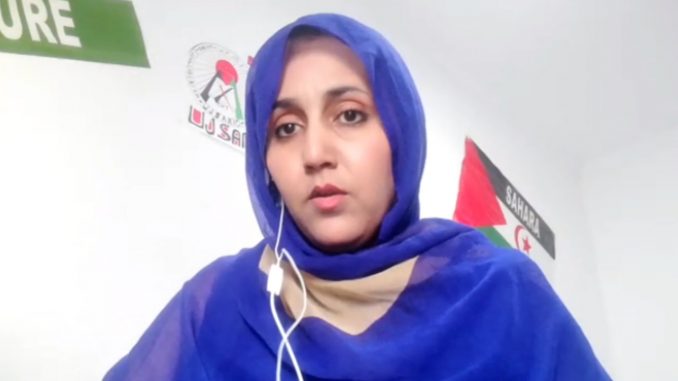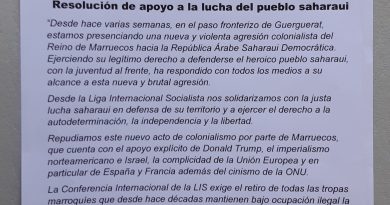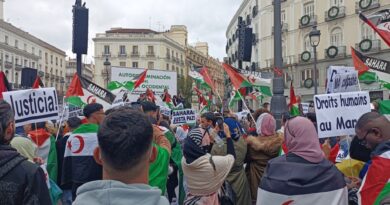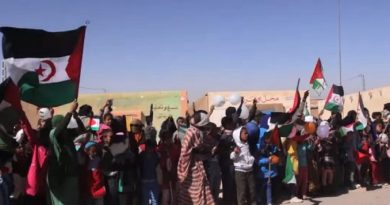Freedom and Self-determination for Western Sahara
We share the complete interview that we carried out in Panorama Internacional toChaia Ahmed Baba, leader of the Union of the Youth of Saguía el-Hamra and Río de Oro (UJSARIO), and the message you sent usHamdi Omar Youbali, also leader of the UJSARIO from the Sahrawi refugee camps in Algeria.
Tell us something about the history of the Saharawi people
Chaia: The Sahara was a Spanish colony. People didn't want it, then when he realized and was more aware of the situation, they protested, they wanted Spain to leave the territory. And there were many attempts by guerrillas to achieve this. There were casualties, there were disappeared.
When Spain left Western Sahara, before leaving her, they did what is the Madrid agreement, which was called Tripartite, what was he 14 November 1975. The agreement was to share the Sahara between Morocco, Mauritania and Spain.
When Spain retired we were left in the war with Morocco and Mauritania. Mauritania withdrew, that's why we have a liberated part of Western Sahara. With Morocco we entered a very strong war, where a lot of blood was spilled. There we have many martyrs.
The Sahrawis were bombed, they had a very bad time. They had to find a more peaceful area, where they could establish a state. They began to carry out this State so that it can be recognized by the world.
Then Algeria was the right place. He is the one who opened his arms to us and there the refuge was established. But it was not an easy refuge, it's in the middle of the desert, lifeless. Can you imagine the situation, but it was enough for the Sahrawis because they wanted to carry out this state and make the world know about this situation.
In 1991 the "ceasefire" was signed because they wanted a peaceful solution. It's not because they couldn't go on with the war, but the UN got involved with the idea of negotiating peacefully and we are peaceful people, we don't want wars, then we accept this agreement. But it did not advance and since then we have been in this fight, Let's say, neither in peace nor in war.
The refuge started in 1975, during the war. But after the "ceasefire", we have focused more on education, which was the starting point of the establishment of this town. It was a non-formal education first, because there were few educated people. There were no universities in Western Sahara due to colonialism. Few people were able to go to universities to study, and from them a non-formal study was made to train the population. That's where education began.
Over time we began to establish the refuge and countries began to recognize Western Sahara, diplomacy began, negotiations started. Something that has not advanced at all.
How is social life, economic and political in Western Sahara today?
Chaia: At the political level we have a varied conflict. We have the state, led by a party that is the Polisario Front. It is a well organized match. In the refuge we have focused on organizing the population. We have something called "Wilaya", which are like provinces, with well organized cells. You can call it the most organized camp in the world, because it is well organized as a state. What happens is that it is in a desert terrain, where there are many possibilities that we do not have.
So politically we have the government, we have the congress every 4 years, and each organization also has its congress. We have the union of women, youth union, the union of the young woman, the workers union.
Economically, we in refugee camps live on humanitarian aid. There are countries that are donors, the European Union, Algeria first.
But there is an exploitation of natural resources in the occupied areas. We are in a very advanced place in the fishing of the Sahara, and in phosphate too. But these resources are highly exploited by the European Union. They negotiate with our natural resources without our consent and without the consent of our only legitimate representative, what is the Polisario Front. Negotiate with Morocco, instead of with the Polisario.
And that cannot be done, because they have no right to negotiate with our fishing. It is not normal for a town to live on donations, of humanitarian aid, having that fishing and that wealth. The sea, it is a shame, bargain with someone's wealth and give them donations.
In the social aspect, is life in the camps. In this desert we have made a life, we have given life. After the war and the "ceasefire" we have been able to establish schools, hospitals, education centers that are like a starter forwards. But there are many problems, for example, there are no job opportunities for youth and that is another obstacle we are facing. Although they have that desire and the resistance to continue fighting, it is very difficult for the spirit of a young person to be unemployed. And what happens is that there is no work. There is not! No chances!
That in the camps, but in occupied areas it is another world. They started to suffer when they started to protest. When going out on the street, by saying we don't want, we want our freedom. They come out peacefully, but they face violence, the prisions. They are mistreated, tortured. Both women and men, they are raped, tortured. They cannot speak freely.
In the universities they cannot be, in schools the same, they can't be on the street, even at home you can't live in peace. They can come at any time, catch you and take you to jail, you can't be at peace.
Morocco says the Sahara is part of Morocco, But then if it is part of Morocco, why don't the people there enjoy those rights?? You say it's part of morocco, but they don't live like the rest of Morocco.
So, we are not only suffering in the camps, but also in the occupied areas, more still. Where a media blockade is also applied there.
How has the struggle for Sahrawi self-determination developed?
Chaia: After the "ceasefire" with the presence or under the control of the UN, the goal was to hold a self-determination referendum. Let the people choose what they want. Morocco says it is part of Morocco, the Polisario says it's from the Sahara. So let that town decide. What do you want? Hold a referendum, can choose. That was the objective of the agreement in the "ceasefire" and to negotiate. But there was no breakthrough. Because the Polisario was always there, insisting and respecting all moments of the negotiation, but Morocco was always like - I don't want this, I don't want the other, now you can't. Know what, if the referendum is held, the people will choose to live under the flag of Western Sahara.
As well, the UN does not want this to advance, because if this international organization wants a breakthrough, does it. But he doesn't want. Many countries in the world negotiated through asking for self-determination or referendum and they have succeeded. Why doesn't the Sahara? Well, the only answer that I'm sure of, is that there are powers, there are powerful countries behind this. There is france, you don't want that to happen, does not want Western Sahara to have its freedom, his sovereignty, his territory. There is also Israel and there are also Arab countries that do not want this to advance.
After the "ceasefire" agreement, The Polisario achieved with its diplomacy that many countries recognized Western Sahara. But the economy outweighs human rights. If a country wants to recognize Western Sahara, but it has its economic business with Morocco, with France or with the European Union, with our fishing, they can't make that decision and go down this road, because they are going to lose in the economy.
So we are in a situation where we feel frustrated, we do not know what to do. The only way that youth and people think is war. There are many people who do not want war. There are mothers, there are children who do not want war. They don't want to lose more people. But year after year it is seen that it is the only solution.
We were born thinking that everyone is living like us, in a desert. We do not live our childhood as it should, we live it between the sand, Sun, the heat, without being able to enjoy the sea, without being able to enjoy our riches, without being able to be with our relatives. For example, my family, my grandparents, my uncles, I never saw them. exist, but I can not. They are in occupied areas, I can not see them, I have never been able to see them. So I don't want another generation to come out that suffers the same, I don't want my children, my grandchildren suffer the same.
So we feel like we don't know what to do. We don't want war, but we don't want this life either. How long are we going to endure the situation we are living in, both in occupied areas and in camps? In the camps there are difficult conditions, there the heat exceeds 56 degrees in the summer. Living in mud houses, covered by metal plates, something that attracts more heat. And with climate change that makes temperatures rise more, that makes us suffer more. We don't want to give up, why can not we, because it doesn't come from our hearts. Because we are fighting for something where there are people who died for this. If those people gave their lives for this cause, of course it's fair. It's a certainty, that when you think of the martyrs, you say, they died, they gave the most precious thing they have which is their lives. So we can hold on. But until when? And above all peacefully. So, I do not see a development of the situation through the UN and through those powers. But we keep resisting.
Women and youth have played a leading role in the rebellions that have crossed the world these years. Is this expressed in Western Sahara as well?
Chaia: Sahrawi women are a fundamental part of the Sahrawi struggle. In times of war, the woman was the one who educated, who established schools with his hands, organized the cells in the wilaya provinces.
Not only did men go to war, there were also women, but most of the women stayed in the camps educating the children, informally or formally, organizing everything. It can even be said that the camp was established by women. In the social, The education, throughout. And they haven't stopped there, have continued and continue to be a fundamental part of this fight.
The Sahrawi woman is a minister, She is a teacher, she is mother, she is a worker, Housewife, of everything. You can find it everywhere, That's why when you come to the camps you will notice that there is an incredible feminine movement. The woman feels free, feels empowered, feels supported by man and not behind man, feels on the same path as man.
In the occupied areas in most of the protests you see women there facing men from the Moroccan army. They hitting them, raping them and they are still there giving everything.
Young people are also the starter. Young people are everywhere. Most of the organizations are youth, because the youth organization exists, the union of youth and sports, the union of the young Sahrawi woman, the union of women.
But the only thing youth feels is frustration. is frustrated, they are in a very critical situation. And what happens is that every year the need is greater and the awareness is greater. And you want to live and fight more. They reach the point of exploding, they can no longer. They already think more about war than peace, although they are peaceful and want peace. But if there are no peaceful solutions then it will be war. They are prepared, both women and men, they are very prepared. They still have faith that it can end peacefully, but every time we see more that it is not possible.
How has the Coronavirus pandemic affected?
Chaia: As I mentioned before that the basis of the establishment of this State was with education.
It started with non-formal education, trying to educate most people, both adults and children, women and men, without having to be of a certain age to study. The old people began to educate themselves and they have succeeded. Since then education was the most fundamental.
Due to the pandemic we have not been able to continue with education, maybe they have achieved something, but not quite. With the internet it was not possible. As we are in a remote area, in the middle of the desert, the connection is a bit difficult. It is difficult to study online, it is impossible. So it's affecting us a lot.
But the danger is in the occupied areas, there were no cases in the occupied areas. But when the occupant realized that there were no cases, did not control the area. He did not apply confinement in the occupied area because it is very good for him to infect people.
Moroccan hospitals do not have quality, They do not care about the life of the Moroccans and much less that of the Sahrawis. So you can imagine the danger. We are not calm. Luckily everything is controlled in the camps, everyone is applying lockdown properly. No cases, we are taking very good care of ourselves, with the few possibilities and material conditions that we have, but we have been able to control this and prevent cases.
How important is international solidarity? And what would you like to say to the LIS militants who listen in different countries of the world?
Chaia: Well, the role that these organizations play is very important in our fight for the support they give us., we feel stronger.
So my message to organizations: it is very important to us that you support this cause, pressure governments, to go out with us, talk about Western Sahara, so the world knows. It's a silenced story, it's a hidden story. All organizations are important to us. What interests us are the common points, the shared struggles. So I feel very happy to be able to find this space where I could express myself, where I could speak about the cause freely. And I really thank you for, give us this time, give us this space and listen to us. We appreciate that very much. And thank you very much and for many more projects ahead.




